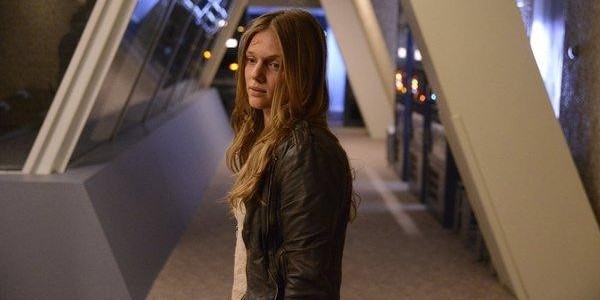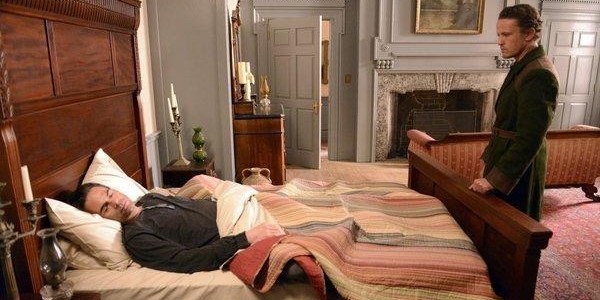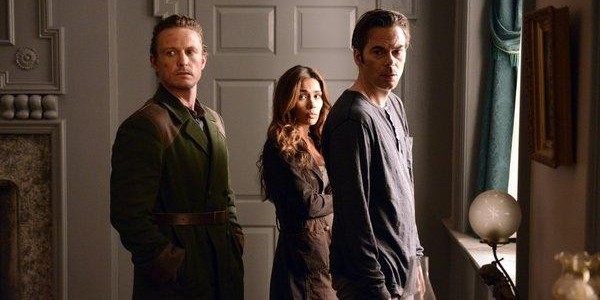
Watching the first 20 episodes of Revolution has been an endurance test; I’ve been vocal about the program’s inability to provide a genuinely intriguing narrative supported by well-drawn and complex characters. At this point, the show hasn’t even reached a level at which it could be viewed as simple, mindless, pulpy entertainment. The show lands uncomfortably between the two extremes: too hokey to qualify as a thought provoking, quality show, but also too ambitious to succeed as pure escapist spectacle or even guilty pleasure entertainment. The interesting premise introduced in the pilot episode has been bogged down by standard, clichéd storytelling and mediocre execution. Still, the show has always managed to do the bare minimum to keep viewers interested and has also managed to produce interesting performances from its cast of actors, even with the series’ questionable material. Those strong actors are what keep the show together; no matter how weak the storytelling may be, we can always count on Giancarlo Esposito to give an entertaining performance. He, along with most of the principal cast, is able to elevate the banal narrative and mediocre dialogue into a watchable endeavor.
The season finale provides the smallest possible glimmer of hope for the series’ future, as the writers have contrived the story into a potential narrative that could lead to starting anew, a clean slate for the show, much like Randall’s very own malevolent, plot-twisty scheme. There is some serious restructuring evident in the finale and its conclusion establishes the prospect of an entirely different type of journey or quest on which the characters can embark. This has the capability to completely alter the nature of the show and imparts the second season with an adequate amount of creative potential. With this hypothetical shift, the writers have the opportunity to refine aspects of the program and edit things that don’t work. After the brief midseason hiatus some retooling improved the show, and while these changes did not exactly transform the series as many had hoped, we felt some definite improvements during the second half of the season. We can only hope that the lengthier break between seasons will allow for more comprehensive and successful evaluations and reformations.
As for the finale itself, “The Dark Tower” is quite an unexceptional season ender. Before the closing moments of the episode with Randall, in which the show goes gleefully off the rails in the most ridiculous yet kind of awesome way, the episode doesn't provide the expected finale-level surprises or suspense. Every plot point and development feels expected and telegraphed and the characters behave exactly as one would think they would, so there is nothing shocking or even startling to disrupt the flat nature of the narrative. Not until the last five minutes does something genuinely astonishing occur. The fact that Randall, who so enthusiastically pursued his objective, is essentially sent (by the President of the United States?) on the world’s most elaborate suicide mission is absolutely, absurdly fantastic. Randall’s conviction, his drive to fulfill this mission is never really explained or implied in any way; when the grand scheme is revealed, it's a bit hard to believe that he would go through all this trouble and receive nothing in return. Why does he have to kill himself? Yes, Miles would eventually find a way to get inside that room, but the priority once he was in there would be to stop those missiles from reaching their target, giving Randall a chance to escape death, at least for the time being. Was the agreement, fifteen years ago, that he have to off himself after he carried out the plan? Despite Randall’s questionable motivations, the revelation is actually intriguing and raises serious questions and implications concerning the Presidential Administration during the time of the blackout. I assume the universe of Revolution is a pseudo-realistic world that adheres to actual history (Presidential portraits in the bunker, etc.), and the blackout might have occurred in some time after Obama’s first term since we do see his portrait in the bunker. This faceless “President” figure could be a former cabinet member who staged this elaborate coup, or the subsequent President who wanted to remain in power and masterminded this convoluted ruse in order to do so. Whatever the details are concerning this plot point, which I admit is compelling and engaging, we are introduced to a hypothetical villain who seems to be so deranged that he makes Monroe and Neville look like complete amateurs. They have absolutely nothing on him.
This final twist was the definite highlight in the episode, which, as I said before, is terribly underwhelming. Everything that happens before is average Revolution fodder. Usually, in a finale episode, we expect to obtain some kind of narrative closure, whether it concerns the mythology or a more character-specific conflict. While we do get some closure mythology-wise (Randall is gone, the tower is somewhat de-mystified, we learn why Aaron was so important, the power is back on, etc.), nothing is really advanced or resolved in terms of character. Almost every single character, except for the dead ones, find themselves in exactly the same place psychologically and in very similar states in the grand scheme of things. If we consider the first half of the season as a introductory period in which we got to know who these characters are, what makes them tick, their backstories, etc., then he second half should work as an exploration of their relationships and a way to show character development and growth. Yet I don’t feel like any of them really showed any signs of significant growth or self-awareness or even an impulse to change. There were moments that are presented in which a character faces the prospect of growth or change, but instead chooses to continue his/her ways. Rachel chooses not to help Nora and instead continue with her borderline obsessive quest to turn the power back on, Neville retains his ruthless ways when he shoots Franklin and pretends it was in self-defense; both of these scenes emphasize the characters’ inability or indifference to change and grow. Because of these developments, the relationships between Rachel and Charlie, as well as Neville and Jason, are once again strained and hostile. There are always going to be characters that resist change and never really grow, but this shouldn’t be done with the overwhelming majority of the characters on the show. How many times can a program explore the same character conflicts before it gets old? Some of these storylines are already stale after the first season; hopefully the narratives introduced in the second season will force the writers to address these issues.
Though it sadly feels like another average episode of the program, “The Dark Tower” ultimately accomplishes the desired objective of a season finale, which is to create enough intrigue and anticipation for the next season. While not ending in an obligatory “cliffhanger,” the questions raised in the final moments are enough to make people return in the fall. The insanity of the plot developments will probably perplex viewers enough that they will feel compelled to tune back in just to see what the writers come up with. It would be really great if the show would embrace the absurdity it played with in those final moments and become an unabashed full-on, over-the-top, pulp fiction story full of magnificent moments like the ones that closed the first season.
Random Thoughts
-- Remember those twelve crucial pendants, key instruments in the quest to turn the power back on? No? It’s okay, don’t worry about it. Neither do the writers.
-- Goodbye to Leslie Hope and Kim Raver. That is if those missiles don’t get intercepted somehow in the second season premiere. It would be really sad to see Julia go because I think she's a very interesting character the show did not get the chance to explore.
-- Tracy Spiridakos is actually semi-engaging in her scene with Rachel, though it did take her twenty episodes to get there.
-- The episode spends a lot of time trying to convince the audience of this incredibly strong connection between Miles and Rachel, but these attempts are not convincing whatsoever. We have actually seen much more interaction between Miles and Nora, and the show spent a lot of time showing us how much Nora meant to Miles and exploring their relationship instead. It is hard to believe the supposed stronger connection between Miles and Rachel when we haven’t seen much evidence of it. A flashback would have been helpful in order to sell that relationship; instead we get characters talking about how much Miles loves Rachel which is not nearly as effective as seeing it.
-- Like how Neville addressed the homoerotic undertones of Miles and Monroe’s relationship. Nice little nod from the writers there.
-- With Aaron saying that the blackout was probably done deliberately, does this absolve Rachel and Ben and the rest of their team from the creation of the blackout? They still developed the technology.